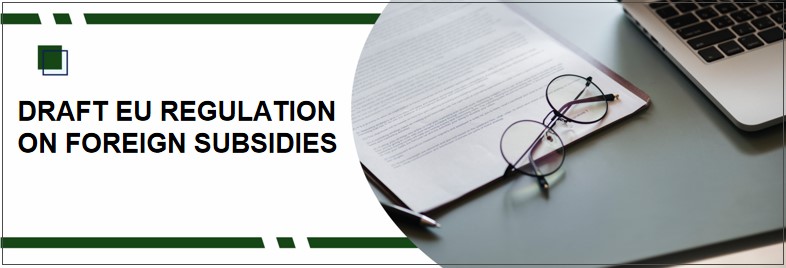DRAFT EU REGULATION ON FOREIGN SUBSIDIES
2021-05-31

As a follow-up to its White Paper on foreign subsidies (June 2020), the European Commission, on 5 May 2021, published a Draft Regulation on non-EU (foreign) subsidies[1]. This is a 65-page document which raises as many questions as it answers. The Chinese Chamber of Commerce to the EU has already expressed concerns about its "rationality" and "necessity" in view of the existing EU and national FDI screening and antitrust tools.
The Draft Regulation covers three specific situations in which non-EU subsidies may trigger an investigation/filing: M&A, public procurement and market conduct (i.e. behavior).
Given that the legislative timetable could be anywhere between 12-15 months before the Draft Regulation becomes final, the purpose of this short newsflash is to alert the reader to what the M&A sections of the final Regulation are likely to entail for Chinese companies.
First, it is important to understand the context. This legislative initiative, like the EU-level FDI screening mechanism already in effect, does not single out China or any other non-EU government. This being said, the EU Commission believes that it is necessary to curb the ability of non-EU government-subsidized companies to distort competition within the EU. In other words, the EU's long-enforced rules relating to EU-government state aids should be expanded to aid received from non-EU governments.
A second note on context: When this Regulation is adopted, it will amount to a de facto shift in FDI screening from the Member States to the European Commission. The new Regulation will operate alongside the existing structure of EU and/or national merger control reviews. For example, a merger falling with the EU Merger Regulation, or alternatively requiring notification to the antitrust authorities of France or Germany, may also trigger a mandatory EU filing under the new Regulation on foreign subsidies.
As currently envisaged, the new Regulation would trigger a mandatory notification when the target's EU turnover exceeds €500 million and the acquirer has received over €50 million in non-EU subsidies over the previous three years.
Like the EU Merger Regulation, there would be a Phase I (25 business days) and potentially a Phase II (90 business days) investigation, during which the deal must be suspended. Like the EUMR, the Commission's powers under the forthcoming Regulation would include the potential prohibition of the merger and approval subject to conditions. Likewise, the Commission may fine the acquiring company up to 10% of its global sales for failing to notify.
The forthcoming Regulation would place a burden on the acquiring company to track and calculate its incoming subsidies from all non-EU government sources over the previous three years. Chinese acquirers would need to take into account not only China-origin aid, but also aid from, for example, India, African and South American nations, and countries participating in the "belt-and-road" initiative.
The contributions qualifying as "foreign subsidies" would include: grants, loans, tax breaks and write-offs, debt forgiveness and guaranties. The Draft Regulation does not explicitly address R&D related government grants and benefits, but one must assume that the value of such aid may also be deemed a "foreign subsidy".
For Chinese SOEs, it is already established EU practice under the EUMR that its thresholds are easily met. Cases such as EDF/CGN/NNB (2016)[2] and ChemChina/Syngenta (2017)[3] have held that the acquirer's turnover includes that of all companies in the same sector within the acquirer's SASAC.
However, the data and analysis to be provided to the Commission under each regulatory scheme will be quite different. The Commission anticipates the hiring of about 145 new officials in anticipation of its enlarged workload relating on foreign subsidies.
Notes:
[1]https://ec.europa.eu/competition/international/overview/proposal_for_regulation.pdf
[2]https://ec.europa.eu/competition/mergers/cases/decisions/m7850_429_3.pdf
[3]https://ec.europa.eu/competition/mergers/cases/decisions/m7962_4097_3.pdf
Authors:
Dr. Frank Fine
Head of Intl Antitrust,
DeHeng Law Offices (Brussel) Executive Director
Head of Intl Antitrust, DeHeng Law Offices (Brussel) Executive Director, China Institute of International Antitrust and Investment Visiting Professor of Law, China University of Political Science and Law (Admitted to practice in England & Wales, California and District of Columbia.)
E-mail:frank.fine@dehenglaw.com
This article was written by the lawyer of DeHeng Law Offices. It represents only the opinions of the authors and should not in any way be considered as formal legal opinions or advice given by DeHeng Law Offices or its lawyers. If any part of these articles is reproduced or quoted, please indicate the source.
